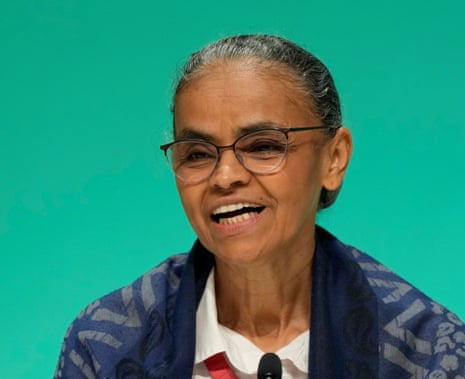EU: Elements of the text are ‘unacceptable’

Patrick Greenfield
Wopke Hoekstra, the EU’s climate tsar commissioner, and Teresa Ribera, Spain’s environment minister, a co-leader of the EU delegation at Cop28 in Dubai, have been giving their reaction to the text.
Both were clear that this is the beginning of a process that could last days. Hoekstra told reporters his flight home was booked for Friday and indicated this was a long way from what was needed.
Ribera said: “We think there are elements in the text that are fully unacceptable. We want to have 1.5C being the safe space. We are going to fight for 1.5C. The current text provides some reference to the science, some reference to 1.5C, but it is not consistent with dealing with energy. We need to get into deeper discussions with many other partners, and of course with the president.”
Hoekstra said: “I cannot hide the fact from you that as it stands, the text is disappointing. It is lengthy, we are still looking into all of the various elements. Yes, there are a couple of good things in there.”

Key events

Fiona Harvey
Avinash Persaud, the climate economist who is also a prominent adviser to Barbados prime minister Mia Mottley, told the Guardian:
This is not a bad text. Some will be disappointed about the lack of clarity on a phase out of fossil fuels, but what this text recognises is the reality that you can’t phase out fossil fuels before you have a massive investment in renewable energy which needs huge finance flows.
This text lays out a plan for a big increase in renewable energy, which we really need to back up with contributions of finance. To get to a phase-out, you need finance, which is what allows the investment in renewables. So to focus on a phase out without finance and renewables would be just virtue signalling. Unless you provide the means of implementation, what does a phase-out mean?
We can live with this text as long as we leave here with an understanding that this means a massive investment in renewable energy in developing countries. That is the only pathway to a phase out of fossil fuels.
Nina Lakhani
Hindou Oumarou Ibrahim from the Chad delegation has lambasted the global stocktake draft as “business as usual”.
Chad is a country really impacted by climate change and we came to the Cop wanting to see global solidarity. The text on fossil fuels is not good enough, it is bad language and contradicts claims that they are guided by science. And these technologies that are not proven, when we know what works.
The developed countries must phase-out fossil fuels, and they must do it fast. They must commit to the finance that the global south needs for their own survival. Let’s do transition but if it’s not inclusive, it cannot work.
Some have suggested the finance part is a bit better than it was but Oumarou Ibrahim is also disappointed. She added:
We also don’t see clarity on finance for adaptation. They say doubling adaptations – but doubling what? Where is the finance going to come from, will it be additional?
But the presidency is not making the decision alone … what we are seeing here is business as usual from the global north again, who don’t want to put in the money and don’t want to change their lifestyle to save humanity.

According to the former US vice-president Al Gore, the conference is “on the verge of complete failure”.
He tweeted: “This obsequious draft reads as if Opec dictated it word for word. It is deeply offensive to all who have taken this process seriously.”
COP28 is now on the verge of complete failure. The world desperately needs to phase out fossil fuels as quickly as possible, but this obsequious draft reads as if OPEC dictated it word for word. It is even worse than many had feared. It is “Of the Petrostates, By the Petrostates…
— Al Gore (@algore) December 11, 2023
EU: Elements of the text are ‘unacceptable’

Patrick Greenfield
Wopke Hoekstra, the EU’s climate tsar commissioner, and Teresa Ribera, Spain’s environment minister, a co-leader of the EU delegation at Cop28 in Dubai, have been giving their reaction to the text.
Both were clear that this is the beginning of a process that could last days. Hoekstra told reporters his flight home was booked for Friday and indicated this was a long way from what was needed.
Ribera said: “We think there are elements in the text that are fully unacceptable. We want to have 1.5C being the safe space. We are going to fight for 1.5C. The current text provides some reference to the science, some reference to 1.5C, but it is not consistent with dealing with energy. We need to get into deeper discussions with many other partners, and of course with the president.”
Hoekstra said: “I cannot hide the fact from you that as it stands, the text is disappointing. It is lengthy, we are still looking into all of the various elements. Yes, there are a couple of good things in there.”

Astute, as usual, from Simon Evans of Carbon Brief, who notes that hardly any of the verbs in the latest draft global stocktake text at Cop28 actually ask for action.
Hardly any of the verbs in the latest draft global stocktake text at #COP28 actually *ask for action*
It’s all “notes”, “recognises” etc etc, with a few weak “invites”and only a very few slightly stronger “calls on”
(most “requests” go to the secretariat or similar) pic.twitter.com/ap0Ygm3tm1
— Simon Evans (@DrSimEvans) December 11, 2023

Adam Morton
‘Epic mess’ – Bill Hare of Climate Analytics
Dr Bill Hare, the climate scientist and chief executive of Climate Analytics, has been to 27 Cops in person and attended the 28th – Cop26 in Glasgow – virtually due to Covid-19.
He told the Guardian that this year’s text was an “epic mess” and there was “no way if it was operationalised that it would keep 1.5C in reach”.
“I would say it’s giving every fossil fuel exporter on the planet everything they need to expand fossil fuel production. They might not say it, they might have crocodile tears, but I think any country involved in exporting coal, oil or gas would be privately very happy.”

Damian Carrington
Policy analysts have reacted negatively to the latest draft text at Cop28, particularly the section on fossil fuels and energy, which is introduced as “actions that could [be] included”, not actions that must be taken. One called it a “choose your own adventure” approach to climate action, describing it as “absolutely disappointing”.
“It’s full of weaker proposals than we’d hoped, and internal contradictions,” said Tom Evans at the E3G thinktank. “On the one hand, it talks of the need to limit temperature rise to 1.5C, to peak emissions in 2025, to cut emissions 43% by [2030] and 60% by 2055. But all of those require concrete actions. What’s in this text doesn’t add up: you have a long menu of options on the energy section, [but] not including the clear, unambiguous phase-out of fossil fuels.” A phase-out did appear in the previous draft.
“What we now need to see are those [countries] who are really pushing for ambition rallying together and trying to flush out and isolate the people who are holding this text back,” Evans said. “One can only hope and pray.” Saudi Arabia has been seen as a key obstructor.
David Waskow, at the World Resources Institute, said: “This text doesn’t send the clear signals that are needed to avert the climate crisis. The suggested set of actions is merely a pick-your-own menu.”
“It’s a ‘choose your own adventure’ approach to climate action,” he said. “But you can’t just pick one, or a couple, out of that list. The world is going to need to tackle all of those transformative changes together. And we know that there are enormous benefits from doing so economically and for development. [The draft text] is absolutely disappointing.
Jamal Srouji, also at WRI, said the text was weaker than previous versions regarding specific timelines for the tripling of renewable energy and phasing down coal, and also on the details of ending fossil fuel subsidies, which run at $7tn a year.
Alex Scott, at E3G, said progress on adaptation for climate change, a vital issue for developing nations, was poor: “We have seen the calls for a roadmap for delivering on doubling [the funding for] adaptation that were in the previous draft of the text have been taken out.”
Nina Lakhani
‘Relieved that it’s not completely biased’ – Third World Network
There’s been a lot of quick takes on what is a pretty substantial and complex document, but the president of the G77 plus China, which represents a bloc of 135 countries, and the African group have told me that they are still digesting.
Meena Raman, Cop veteran and climate policy expert from the Third World Network, says that she’s relieved that it’s not totally biased towards the wealthy nations, and that there’s likely to be a diversity of reactions from the developing and developed world. She said:
“It reads like the president is trying to manage a balancing act, with some things the G77 proposed, and others that developed countries pushed for. We don’t know yet how the parties will react, but you can never keep everyone happy – that’s negotiating – it’s always a delicate balance. But I am a bit relieved that it’s not completely biased. The language on finance seems a little bit stronger, but then we have global targets pushed for by the EU. For the first time we have language in the text about consumption and production, which is interesting… remember George Bush said ‘the American lifestyle is non-negotiable’.
Raman, who will be present for the countries’ reaction tonight, left me with one piece of advice: “This isn’t the final text, things can still happen.”
Amazon rainforest to host first Cop in 2025
Brazil has been formally chosen to host the 30th conference of the parties to the United Nations framework convention on climate change.
Cop30 will take place in the city of Belém between November 10 and 21 2025. This will be the first Cop to be held in the Amazon rainforest, which will be an opportunity to put nature back at the forefront of the climate debate, rather than it be marginalised by energy, technology and markets.
Marina Silva, Brazil’s minister of the environment and climatechange, said:
“With its immense biodiversity and vast territory threatened by climate change, the Amazon will show us the way. It will also remind us of how the three Rio conventions are intertwined not only in their challenges, but also in the synergistic solutions it provides. Holding Cop30 in the heart of the forest is a strong reminder of our responsibility to keep the planet within our 1.5C mission.”

Before that, however, will be Cop29, which will be held in Azerbaijan, the third petrostate in a row to host the conference.
‘The makings of a historic text … but too weak’ – Grantham Institute
A more nuanced take by Bob Ward, the policy and communications director at the Grantham Research Institute on Climate Change and the Environment at the London School of Economics and Political Science:
“This has the makings of an historic text, which recognises for the first time in the outcome of a United Nations climate change summit that the production and consumption of fossil fuels need to be cut and replaced by cleaner alternatives in order to achieve net zero emissions of greenhouse gases by mid-century. However, the text is too weak at the moment because it only suggests parties could, rather than should, reduce fossil fuels consumption and production. This should not be optional …
“This text should now require all fossil fuel producers, including the UK, to show how they will cut their outputs in line with the goal of reaching net zero emissions globally by mid-century.
“The text also includes many other important points showing that countries have recognised the extremely sobering findings of the global stocktake that strong and urgent action is required across many areas, including adaptation, loss and damage and climate finance.
“It is now vitally important that this text is not watered down over the coming hours, and is bolstered in key areas, to provide impetus to countries to strengthen the ambition of their national actions in revised pledges that are due to be submitted in 2025.”
‘We need [phase out] in the text’, says Colombia minister
Susana Muhamad, Colombia’s environment minister, said:
“We need [phase out] in the text. We need to acknowledge that we need 43% reduction by 2030, which is not here. We need 1.5C. 2050 is too late. If we don’t get 2030, we don’t have 2050 and we don’t have 1.5C. We have to concentrate.”
—
Alok Sharma, who chaired Cop26 in Glasgow, is unimpressed by the new draft.
It is difficult to see how this text will help to achieve the deep and rapid cut in emissions we need by 2030 to keep 1.5c alive
With so many countries backing clear language on fossil-fuel-phase-out, who does this text actually serve?#COP28 https://t.co/bmNY78AmmT
— Sir Alok Sharma (@AlokSharma_RDG) December 11, 2023
‘Our voices are not being heard’ – Alliance of Small Island States
The Alliance of Small Island States (AOSIS) serves almost as a conscience for climate Cops because its member nations are among the most vulnerable to global heating and rises in sea levels. It has added his voice to the chorus of condemnation for the new draft of the Cop28 global stocktake.
Cedric Schuster, the chair of AOSIS and a cabinet minister of Samoa, said in a statement:
“We are concerned that the process at this time is not in the spirit of multilateralism. As SIDS [small island developing states], we feel our voices are not being heard, while it appears that several other parties have enjoyed preferential treatment, compromising the transparency and inclusivity of the process.
“We are greatly concerned that this lack of a platform to air our views has resulted in weak language that will obliterate our chances of maintaining the 1.5C warming limit …
“Finance and mitigation must go hand in hand. Developed countries must lead because they have the resources to do so, we call on major economies to take the lead here in finance flows.
“We will not sign our death certificate. We cannot sign on to text that does not have strong commitments on phasing out fossil fuels …
“And we remind you yet again – our small island developing states are on the frontlines of this climate crisis, but if you continue prioritising profit over people, you are putting your own future on the line.
“We call on our allies to support our call and stand with us to keep 1.5 alive.”
Another damning take on the draft, this time from John Silk, who is the head of delegation for Republic of the Marshall Islands:
“The Republic of the Marshall Islands did not come here to sign our death warrant. We came here to fight for 1.5 [C] and for the only way to achieve that: a fossil fuel phase-out. What we have seen today is unacceptable. We will not go silently to our watery graves. We will not accept an outcome that will lead to devastation for our country, and for millions if not billions of the most vulnerable people and communities.”
Interesting take by Mike Davis, CEO of Global Witness, the watchdog group that has produced some strong analysis of the presence of lobbyists in the climate conference:
‘‘When climate talks are flooded by thousands of fossil fuel lobbyists, it’s no surprise that those talks flop. Cop’s failure to agree to phase out the fossil fuels that are wrecking the planet and making people poorer has the industry’s fingerprints all over it.’’
Another negative response to the latest text of the Global Stocktake from Kaisa Kosonen, head of the Greenpeace Cop28 delegation:
“It’s a dog’s dinner! If this is all we get from Cop28, then this conference was a failure.
“Acting in line with science doesn’t mean you can do whatever you want. Phasing out fossil fuels is not a choice any more!
“The text has a menu of things countries might choose to do or not to accelerate the energy transition. While reducing both consumption and production of fossil fuels to achieve net zero around 2050 is there too, it’s only one of the many options that countries could act on or not.
“This doesn’t capture the historical momentum we’ve witnessed over the past couple of weeks. It’s written in the interest of the fossil fuel industry and not for the people, communities and all life on Earth that needs urgent action the most.
“This leaves the door open to a host of false solutions that will benefit the oil, gas and coal industries instead of providing a safe, fair and equitable future for all of us.”

Patrick Greenfield
Reporters have been waiting for 20 minutes to hear Sultan Al Jaber give his reaction to the first draft. He has still not arrived. The Sultan often keeps journalists waiting and has already cancelled one press conference today. Is he coming? We will soon find out. There’s a scrum of media waiting to speak with him.
Al Jaber has consistently said this will be a historic agreement that keeps 1.5C alive. Many do not think this text is good enough.
Nina Lakhani
Most eyes seem to be focused on the missing phase out/down language, but for the African groups – and many developing countries – the means and finance for climate adaptation is a life-or-death issue. And while the long-delayed global goal on adaptation outcomes hasn’t yet been released, Brandon Wu, director of policy and campaigns at ActionAid US is unimpressed with how developed countries seem to be trying once again to wriggle out of their financial obligations defined in the Paris agreement as ‘common but differentiated responsibilities’ (CBDR).
“There doesn’t appear to be any language that points to the obligation of developed countries to provide finance for adaptation – or mitigation. There was a paragraph that originally emphasised providing finance for developing countries but that’s been weakened and instead only recalls the need for finance. Again this is no surprise, as this has been the push from developed countries, not just in the GST but also in the global goal on adaptation and just transition work programs to remove any language saying that developed countries are the ones obligated to provide finance.”
Ed King, a veteran watcher of climate diplomacy, has listed the following key takeaways:
1. Fossil fuel phaseout/energy transition – reference on reducing fossil fuel consumption and production exists but no urgency to take any action in this critical decade which is key for 1.5C.
2. There are no options in text on any point. What are parties meant to negotiate on? Is this a floor or a ceiling?
3. The commitments on finance, on support mechanisms, on holding to the science, are scattered all over the text. How should we understand what the intention of this text is?
4. The words “oil and gas” do not appear anywhere in the text and the phase out of coal is optional. Is this a weakening of previous commitments on coal at Cop26 and 27?